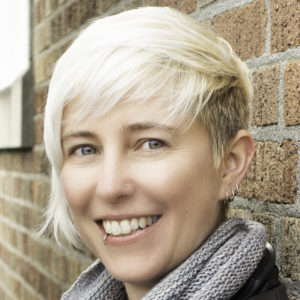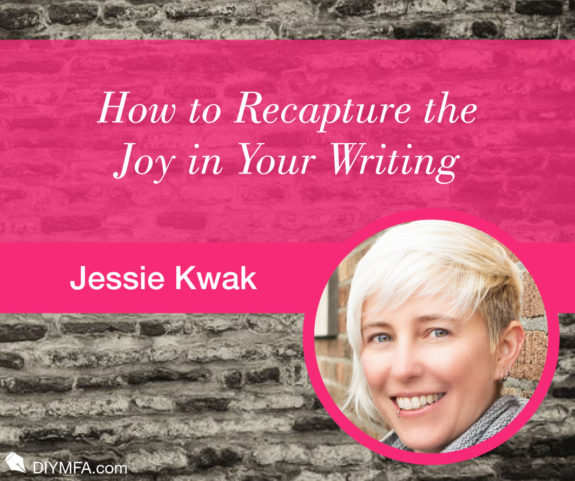I didn’t start writing because I wanted to make a bestseller list or sell a million copies. I started writing because it was fun. It brought joy. As a child, I delighted in telling myself stories. I loved imagining secret worlds no one else could see. I got a kick out of creating plot twists and double-crosses, then getting my characters into trouble and having them bravely fight their way back out.
Even the process of carefully hand-writing these stories in a spiral-bound notebook was deeply satisfying—I loved finding just the right words in my growing vocabulary to describe the scenes I imagined.
Writing was a blast!
Middle school Jessie would be thrilled to know that adult Jessie makes a living writing. But I bet she’d be mystified to hear me say that some days it’s kind of a slog.
Losing the Joy
Sometimes, in my quest to become a more “productive” and “serious” writer, I end up losing the joy. I know I’m not alone—so many of the conversations I have with writer friends revolve around our frustrations with the writing process, rather than the joy we get out of it.
That’s such a shame, especially because so many of the external writing rewards fall into other people’s hands: Will an agent pick this book up? Will readers like it? Will it find an audience?
The only thing you have much control over in the publishing journey is your writing process. And if you’re going to be spending so many days and months and years in the act of writing, why not find some joy in it?
If you’ve been feeling frustrated with your writing more often than not, I encourage you to start experimenting to see where you can tease out more joy. I guarantee when you’re having more fun writing, you’ll start to see improvements in productivity, too!
Experiment with finding space
Writing may seem like a primarily mental act, but we perform it in a physical space—and that space can make the difference between a fun writing day and a frustrating one.
Having a dedicated workspace is a total luxury, especially in these last few years when many of us (and our partners and families) are working and studying from home instead of in the offices we used to go to before the pandemic. But you can still experiment with manipulating your physical space in order to make that creative energy flow.
What do you hear while you’re trying to work? If it’s distracting, can you use white noise, music, or noise-canceling headphones to block it out?
What do you see when you look up from your computer or notepad? Is it stacks of unpaid bills, your to-do list, a messy living room? Even if you’re not consciously thinking about those things, your brain is wasting energy blocking them out. Remove distractions from your line of sight, try writing from a coffee shop, or put up a screen to separate you from the chaos around you.
Try a standing desk or a treadmill desk. Try dictating while you walk around the neighborhood. Try writing from the couch, or on the front porch. Even if your writing space only consists of a laptop and the seat you’re sitting in—play with it!
Experiment with ritual
Our willpower is weak, which is why we can easily find ourselves defaulting to a bad habit when we encounter a trigger. For example, I irresistibly want to buy Lindt chocolate whenever I’m in line at the fabric store.
Use that tendency for good by creating writing triggers that can help you get into the creative groove more quickly.
Ritual is a good way to trigger your brain into writing mode. Light a candle or brew a cup of special tea. Do a short meditation, or go for a walk around the block. Turn on music or white noise (I always write to the same thunderstorm track), then fire up that word processor.
You can train your brain to associate this ritual with getting down to business—and, eventually, you’ll find yourself eagerly anticipating the work when you encounter the ritual.
Experiment with how you draft
Everyone has a completely unique style when it comes to how they go from idea to finished draft, but that doesn’t stop most of us from trying to find the “right” way to write.
When you experiment with how you draft, start by listing your strengths and the things you love most and use those as the basis from which to play with new methods. Let go of all the advice about what you “should” be doing, and begin experimenting with what feels good to you.
Do you love the thrill of the first draft, careening into the darkness in pursuit of plot bunnies? There’s no reason for you to force yourself to become an outliner. But you might find tips and tools in an outliner’s toolbox—like scene beats or writing in an act structure—that work for you.
Maybe you’re like me, and you hate the uncertainty of the first draft, but you love revision. Try writing a zero draft to block out the scene, sketch out the dialogue, and brainstorm setting and costume choices. Then, “revise” the details of that zero draft instead of wrestling with a first draft.
But don’t throw the baby out with the bathwater while you’re experimenting! You know which parts of your process work well—and give you the most joy.
Experiment with how you count your wins
When is it finally time to celebrate your writing? When you finish the first draft? The fifth? When you land an agent, hit Publish on the ebook retailers, or finally see your book on your local bookstore’s shelf?
The writing and publishing process is a long journey, and it’s too easy to put off celebration. “My book’s not done yet,” you might tell yourself. “I still need to [fill in the blank].”
Experiment with celebrating more milestones. Did you finish writing act 1? Tell a friend! Did you finally figure out a tricky plot snag? Hell yeah! Take yourself out to dinner. Did you have a personal best word count day? You deserve to go fabric shopping—and pick up one of those Lindt chocolates in the check-out line while you’re at it.
It’s impossible to escape the pressures of the outcome: publication schedules, word count goals, the agent hunt, and the need to produce more work faster. But don’t let those outcome pressures sap the joy of the writing process itself.
After all—if you’re going to be a writer, you’re going to spend a significant portion of your days in the process of writing.
Why not recapture the joy?
Tell us in the comments: How do you find joy in your writing?

Jessie Kwak has always lived in imaginary lands, from Arrakis and Ankh-Morpork to Earthsea, Tatooine, and now Portland, Oregon. She is the author of gangster sci-fi, supernatural thrillers, and non-fiction for creatives. She’s also a ghostwriter and freelance marketing copywriter. Her latest book is From Big Idea to Book: Create a Writing Practice That Brings You Joy.
You can learn more about her at www.jessiekwak.com, or follow her on Twitter or Instagram.







